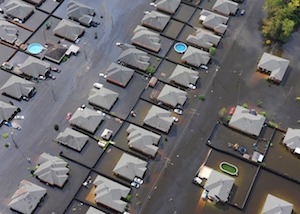Sign up for our information-filled email newsletter

How Do Natural Disasters Impact Our Children?

Whether you live in one of the states hard-hit by Hurricanes Harvey and Irma or not, it’s difficult to ignore what a natural disaster might mean for your family. In the aftermath of the devastating power of these hurricanes or the recent fires, floods, and earthquakes occurring all around us, it’s common for adults to be scared, but what about children? Not surprisingly, children react in their own way when disasters happen.
The Center for Disaster Philanthropy reminds us that “children are not just little adults —especially in response to disaster.”[1] Each one of us responds to stress differently. Peter Levine, a psychological trauma theorist, explains that “any overwhelming and distressing experience” can cause trauma.[2] Numbness or denial from the shock of a sudden and overwhelming event can give way to symptoms that include guilt, depression, and anxiety. According to the American Psychological Association, long-term reactions include unpredictable emotions, flashbacks, strained relationships and even physical symptoms like headaches or nausea.[3] Children may have sleeping or eating issues or revert to thumb-sucking or bed-wetting. Some adults and children may find it difficult to move on from these feelings, and that’s where a professional therapist or counselor can help.
The National Child Traumatic Stress Network Children (NCTSN) explains that children will react differently to a natural disaster and its aftermath depending on their age, developmental level, and prior experiences. Some will withdraw, while others will have angry outbursts. Others will become agitated or irritable. Parents, teachers, and caregivers need to be sensitive to each child’s coping style.[4]
Using age-appropriate books can be an excellent way to discuss any anxiety or worry children may be feeling related to an approaching disaster. There are fantastic options – from picture books that can be read together to more school-age alternatives – that may help children understand an impending danger and how to cope with the feelings it is bringing up.
Letting a child know that it is all right to be upset about something bad that happened is imperative. Even those not in the path of a natural disaster may experience troubling feelings or worry when hearing about what could happen to others. School-age children can feel directly affected by difficult news.[5] Take the opportunity to talk about a story they’ve seen on tv and to reassure them. Remember that kids are observant, so they’re taking cues from adults. No matter their age – preschool to high school – they’ll mirror the way the adults around them act.[6]
What Can Parents Do to Help Children After a Disaster?
Remember when the flight attendant reminds us to put on our oxygen mask first? That’s so we can take care of others. When dealing with the aftermath of a hurricane, flood or fire, it’s important to remember that children will look to adults to know how to cope so self-care is critical to the well-being of the family. To be able to give children what they need, parents must take time to react privately if they feel overwhelmed or helpless.
It may be important to correct misunderstandings and reassure children. Some may be afraid that a disaster will come to their community. Take time to talk about the natural hazards that are local, and teach them some simple ways to keep themselves safe.[7] Let them know if there are dangers that children can prepare for, or reassure them that some events will not come to their area. If your family has a disaster kit (or needs one), kids can help put it together or help choose one item they would take along. Preparedness instruments such as FEMA’s Disaster Fact Sheet’s for Kids that share specifics and tools for before and after can help children find power in a powerless situation.[8]
It will take time for children to mentally and emotionally recover from a disaster, and everyone needs to express their stress in different ways to cope. The NCTSN has an excellent resource for caregivers working with teens dealing with trauma or death.[9] This tool can facilitate a non-judgmental conversation that considers the teen’s point of view.
Routine can be a coping mechanism for both adults and children after a trauma. Look for ways to re-establish some regular tasks and schedules that were in place before the crisis. Tell the same bedtime stories, try to eat some of the same foods, and use or replace favorite blankets or toys. This will help both the children and the parents.[10] Reassure children that they are loved and that they can talk openly about anything worrying or upsetting them.
Pride Surveys offers opportunities for children to share their thoughts about what may be troubling them through our student surveys. We take the guesswork out of the surveying process to ask the difficult questions. Browse the different types of student surveys we offer and find out why Pride Surveys is the best choice to help you survey your school. Questions? Give us a call at 800-279-6361 or fill out our quick online contact form.
[1] “Issue Insight: Children.” Retrieved 19 September, 2017 at http://disasterphilanthropy.org/issue-insight/children/
[2] “The Trauma That Arises from Natural Disasters.” Retrieved 19 September, 2017 at https://www.psychologytoday.com/blog/somatic-psychology/201004/the-trauma-arises-natural-disasters
[3] “Trauma.” Retrieved 19 September, 2017 at http://www.apa.org/topics/trauma/
[4] “Natural Disasters.” Retrieved 19 September, 2017 at http://www.nctsn.org/trauma-types/natural-disasters
[5] “Helping Children Cope with Disasters and Traumatic Events.” Retrieved 19 September, 2017 at http://www.med.umich.edu/yourchild/topics/disaster.htm
[6] “Help Kids Cope After Natural Disasters.” Retrieved 19 September, 2017 at http://www.wfmynews2.com/news/local/good-morning-show/help-kids-cope-after-natural-disasters/474226914
[7] “Children as Victims of Natural Disasters.” Retrieved 19 September, 2017 at https://ag.purdue.edu/extension/eden/disasters/child%20victims.pdf
[8] “Disaster Fact Sheets for Kids-Ready Kids (English).” Retrieved 19 September, 2017 at https://www.fema.gov/media-library/assets/documents/34288
[9] “Helping Teens with Traumatic Grief: Tips for Caregivers.” Retrieved 19 September, 2017 at http://www.nctsn.org/sites/default/files/assets/pdfs/helping_teens_with_traumatic_grief_caregivers_final.pdf
[10] “Children as Victims of Natural Disasters.” Retrieved 19 September, 2017 at https://ag.purdue.edu/extension/eden/disasters/child%20victims.pdf

- Why Community Advocates Should Include Students at the Beginning
- How Students Can Lessen School Stress
- How Teens Deal with Anxiety
- The Importance of Finding a Mentor in High School
- Why Teens Develop a Negative Body Image and How to Help Them Avoid it





